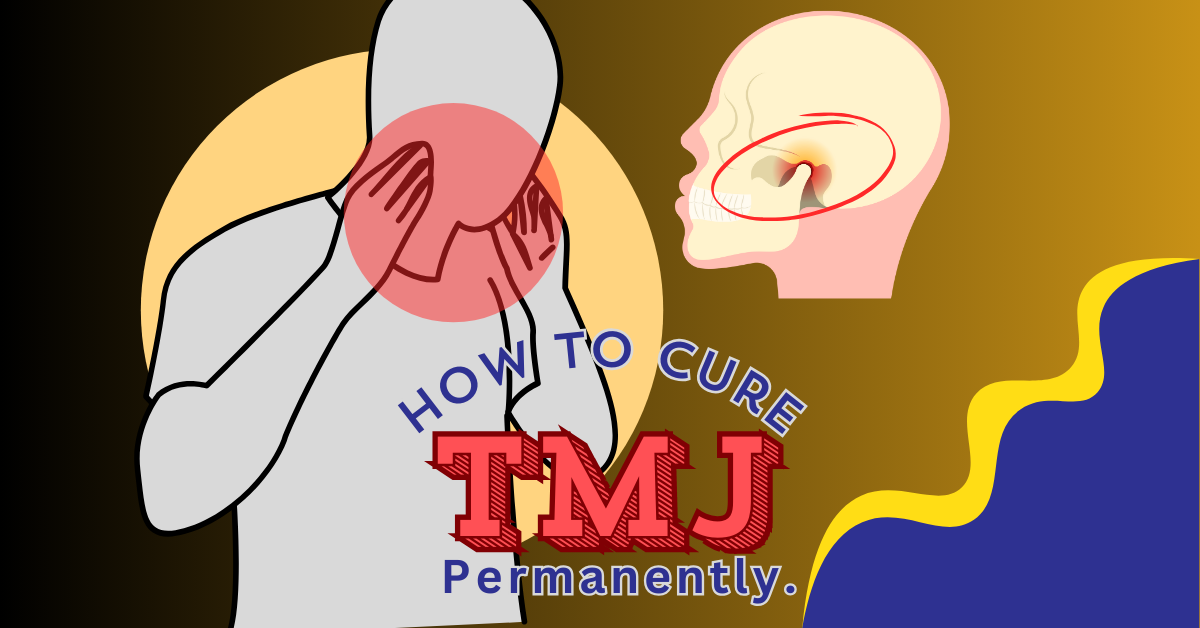1. Introduction: Understanding TMJ and Its Impact
Temporomandibular Joint Disorder (TMJ) affects the jaw joint and surrounding muscles, causing pain and difficulty in movement. People with TMJ experience symptoms like jaw pain, headaches, earaches, and difficulty in chewing. This condition can severely impact daily life, making it essential to find effective treatments. In this comprehensive guide, we’ll explore various natural remedies, exercises, and professional treatments that can help how to cure TMJ permanently.
2. Common Causes of TMJ Disorder
Understanding the root causes of TMJ disorder is the first step toward effective treatment. Here are some common factors that contribute to the development of TMJ:
Jaw Misalignment
Improper alignment of the jaw can put excessive pressure on the temporomandibular joint, leading to inflammation and pain.
Stress and Anxiety
Stress often causes people to clench or grind their teeth (a condition known as bruxism), which can strain the jaw muscles and contribute to TMJ.
Injury or Trauma
Injuries to the jaw or head can damage the TMJ, resulting in chronic pain and difficulty in movement.
Arthritis
Arthritis can affect the TMJ, just like any other joint in the body, causing inflammation and pain.
Poor Posture
Maintaining a poor posture, especially while using a computer or smartphone, can affect the muscles around the jaw, contributing to TMJ symptoms.
3. The Importance of Early Treatment for TMJ
Early intervention is crucial when dealing with TMJ disorder. Left untreated, TMJ can lead to more severe issues such as chronic pain, limited jaw movement, and even changes in facial structure. Early treatment can help reduce inflammation, relieve pain, and prevent the condition from worsening. It’s essential to seek medical advice as soon as you notice symptoms to avoid long-term complications.
4. Top 5 Natural Remedies to Cure TMJ Permanently
Natural remedies can provide long-lasting relief from TMJ pain without the side effects of medication. Here are the top five remedies:
1. Heat and Cold Therapy
Applying a warm compress to the affected area can help relax the jaw muscles and reduce pain. Alternatively, using a cold pack can reduce inflammation and numb the pain. Use heat for 15-20 minutes, followed by cold therapy for 5-10 minutes.
2. Massage Therapy
Gently massaging the jaw muscles can help improve blood circulation and reduce muscle tension. Use your fingers to massage the jaw in a circular motion for 5-10 minutes daily.
3. Herbal Remedies
Herbs like turmeric and ginger have anti-inflammatory properties that can help reduce TMJ pain. You can consume these herbs as teas or supplements to alleviate symptoms.
4. Magnesium Supplements
Magnesium is known to relax muscles and reduce tension. Taking magnesium supplements can help ease muscle spasms and pain associated with TMJ.
5. Relaxation Techniques
Practices like yoga, meditation, and deep breathing can help reduce stress and prevent teeth clenching or grinding, which are common triggers for TMJ.
5. TMJ Exercises for Permanent Relief
Exercises can play a vital role in strengthening the jaw muscles and relieving TMJ pain. Here are some effective exercises you can do at home:
1. Jaw Stretch
Open your mouth as wide as comfortable, then slowly close it. Repeat this exercise 5-10 times. This helps stretch the jaw muscles and improve mobility.
2. Resistance Exercise
Place your thumb under your chin and gently push upward while trying to open your mouth. Hold for 5-10 seconds, then relax. Repeat 5 times. This strengthens the jaw muscles and improves stability.
3. Tongue-Up Exercise
Place your tongue on the roof of your mouth and slowly open and close your mouth. Repeat this exercise 10 times. It helps align the jaw and reduce tension.
4. Goldfish Exercise
Place one finger in front of your ear and another finger on your chin. Open your mouth halfway and hold for a few seconds. Repeat 5-10 times. This exercise helps with jaw alignment and reduces clicking or popping sounds.
5. Side-to-Side Jaw Movement
Move your jaw from side to side, holding each position for a few seconds. Repeat this exercise 10 times. It helps improve jaw flexibility and reduces pain.
6. How to Manage Stress and Its Effect on TMJ
Stress is a significant factor in TMJ disorders. Managing stress effectively can reduce symptoms and prevent further damage. Here are some techniques to manage stress:
Practice Mindfulness Meditation
Mindfulness meditation helps reduce anxiety and promotes relaxation. Spend 10-15 minutes daily focusing on your breathing and clearing your mind.
Engage in Regular Exercise
Physical activities like walking, jogging, or yoga can help reduce stress and improve overall well-being. Exercise also releases endorphins, which act as natural painkillers.
Maintain a Consistent Sleep Schedule
Getting enough sleep is crucial for reducing stress and promoting healing. Aim for 7-9 hours of quality sleep each night.
Avoid Caffeine and Alcohol
Caffeine and alcohol can increase anxiety and lead to teeth grinding. Limiting their consumption can help reduce TMJ symptoms.
7. Best Dietary Changes for TMJ Relief
Diet plays a crucial role in managing TMJ symptoms. Here are some dietary changes that can help reduce pain and inflammation:
Eat Soft Foods
Choose soft foods that require minimal chewing, such as soups, smoothies, and yogurt. Avoid hard, crunchy, or chewy foods that can strain the jaw.
Include Anti-Inflammatory Foods
Incorporate foods rich in omega-3 fatty acids, such as salmon, walnuts, and flaxseeds, to reduce inflammation. Also, include plenty of fruits and vegetables, especially those high in vitamin C and antioxidants.
Avoid Chewing Gum
Chewing gum puts extra stress on the jaw muscles and can exacerbate TMJ symptoms. Avoid gum and other chewy snacks like toffees and caramel.
Stay Hydrated
Drinking plenty of water helps maintain joint lubrication and overall health. Aim for at least 8 glasses of water per day.
8. Professional Treatments for TMJ Disorder
If natural remedies and exercises are not providing sufficient relief, professional treatments may be necessary. Here are some options:
Dental Splints and Mouthguards
Custom-made splints or mouthguards can help realign the jaw and prevent teeth grinding. They are worn at night and provide significant relief for many TMJ sufferers.
Physical Therapy
A physical therapist can teach you exercises and techniques to improve jaw mobility and reduce pain. Therapy sessions may include ultrasound, heat therapy, and manual manipulation of the jaw.
Medications
Over-the-counter pain relievers, anti-inflammatory drugs, and muscle relaxants can help manage TMJ symptoms. In some cases, your doctor may prescribe stronger medications.
Injections
Injections of corticosteroids or Botox into the jaw muscles can help reduce inflammation and pain. These treatments are usually considered when other methods have not been effective.
Surgery
Surgery is considered a last resort for severe TMJ cases. Procedures may include arthroscopy, open-joint surgery, or joint replacement, depending on the severity of the condition.
9. Holistic Approaches to Cure TMJ Permanently
Holistic treatments focus on healing the whole body and addressing the root causes of TMJ. Here are some effective holistic approaches:
Acupuncture
Acupuncture involves inserting thin needles into specific points on the body to release tension and promote healing. It can be effective in reducing TMJ pain and improving jaw function.
Chiropractic Care
A chiropractor can help realign the spine and jaw, reducing pressure on the TMJ. Chiropractic adjustments can improve posture and relieve pain.
Osteopathy
Osteopathic treatment involves gentle manipulation of the muscles and joints to improve function and relieve pain. It’s a non-invasive option for treating TMJ.
Homeopathy
Homeopathic remedies like Arnica and Belladonna are used to reduce inflammation and pain. Consult a qualified homeopath for personalized treatment.
10. Conclusion: Achieving a Pain-Free Life with TMJ
Curing TMJ permanently requires a combination of natural remedies, lifestyle changes, and professional treatments. By understanding the root causes and taking a proactive approach, you can achieve lasting relief and prevent future complications. Incorporate the tips and techniques discussed in this guide to manage your symptoms and regain control of your life.
Remember, it’s essential to consult with healthcare professionals to determine the best treatment plan for your specific condition. With the right approach, a pain-free life is within reach.
FAQs About How to Cure TMJ Permanently
Q1: What is TMJ disorder and what causes it?
A1: TMJ disorder refers to dysfunction or pain in the temporomandibular joint, which connects the jawbone to the skull. Common causes include jaw misalignment, stress, teeth grinding (bruxism), injury, arthritis, and poor posture.
Q2: Can TMJ be cured permanently?
A2: Yes, TMJ can often be cured permanently through a combination of natural remedies, exercises, lifestyle changes, and professional treatments. Early intervention and consistent management are key to achieving long-term relief.
Q3: What are the best natural remedies to relieve TMJ pain?
A3: Effective natural remedies include heat and cold therapy, massage therapy, herbal supplements like turmeric and ginger, magnesium supplements, and relaxation techniques such as yoga and meditation.
Q4: What exercises can help cure TMJ permanently?
A4: TMJ exercises such as jaw stretches, resistance exercises, tongue-up exercises, goldfish exercises, and side-to-side jaw movements can help strengthen and relax the jaw muscles, providing long-term relief.
Q5: How does stress affect TMJ, and how can I manage it?
A5: Stress can lead to teeth grinding and jaw clenching, which exacerbate TMJ symptoms. Managing stress through mindfulness meditation, regular exercise, maintaining a consistent sleep schedule, and avoiding caffeine and alcohol can help reduce TMJ pain.
Q6: What foods should I avoid if I have TMJ disorder?
A6: Avoid hard, crunchy, or chewy foods such as nuts, popcorn, and gum, as they can strain the jaw muscles. Stick to soft foods like smoothies, yogurt, and soups to minimize jaw pain and discomfort.
Q7: When should I seek professional treatment for TMJ?
A7: If natural remedies and exercises do not provide sufficient relief, or if you experience severe pain, jaw locking, or difficulty in movement, consult a healthcare professional. They can recommend treatments such as dental splints, physical therapy, medications, or even surgery if necessary.
Q8: Can chiropractic care help with TMJ disorder?
A8: Yes, chiropractic care can be effective in treating TMJ disorder by realigning the spine and jaw, reducing pressure on the TMJ, and improving overall posture, which can alleviate pain and improve function.
Q9: What role do dietary changes play in curing TMJ permanently?
A9: Dietary changes can help reduce inflammation and relieve TMJ symptoms. Eating anti-inflammatory foods like fruits, vegetables, and omega-3 rich foods, while avoiding hard and chewy foods, can support jaw health and reduce pain.
Q10: Is surgery necessary to cure TMJ?
A10: Surgery is typically considered a last resort for severe TMJ cases that do not respond to other treatments. Less invasive options like splints, physical therapy, and medication should be explored first. Surgery may involve procedures like arthroscopy, joint replacement, or open-joint surgery, depending on the severity of the condition.




